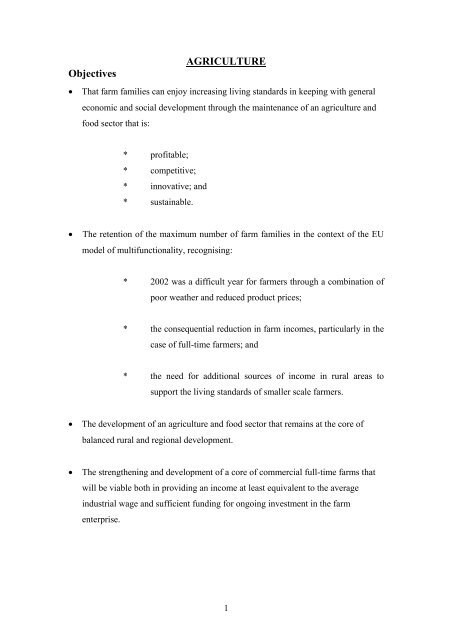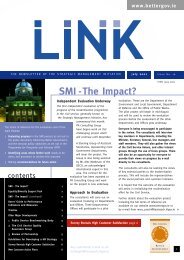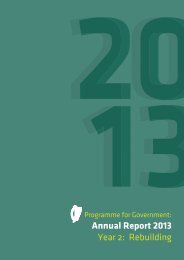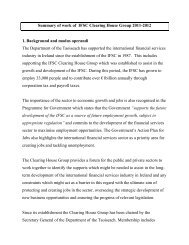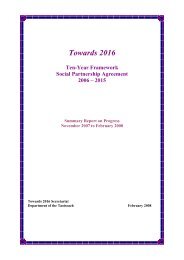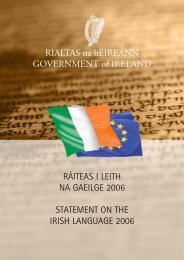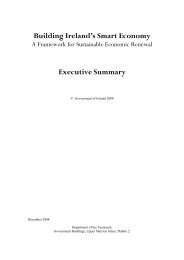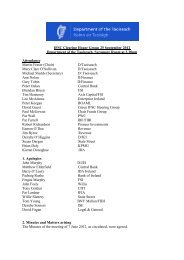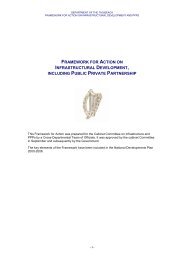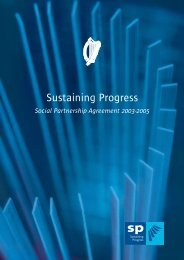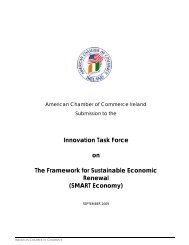AGRICULTURE Objectives - Department of Taoiseach
AGRICULTURE Objectives - Department of Taoiseach
AGRICULTURE Objectives - Department of Taoiseach
You also want an ePaper? Increase the reach of your titles
YUMPU automatically turns print PDFs into web optimized ePapers that Google loves.
<strong>AGRICULTURE</strong><strong>Objectives</strong>• That farm families can enjoy increasing living standards in keeping with generaleconomic and social development through the maintenance <strong>of</strong> an agriculture andfood sector that is:* pr<strong>of</strong>itable;* competitive;* innovative; and* sustainable.• The retention <strong>of</strong> the maximum number <strong>of</strong> farm families in the context <strong>of</strong> the EUmodel <strong>of</strong> multifunctionality, recognising:* 2002 was a difficult year for farmers through a combination <strong>of</strong>poor weather and reduced product prices;* the consequential reduction in farm incomes, particularly in thecase <strong>of</strong> full-time farmers; and* the need for additional sources <strong>of</strong> income in rural areas tosupport the living standards <strong>of</strong> smaller scale farmers.• The development <strong>of</strong> an agriculture and food sector that remains at the core <strong>of</strong>balanced rural and regional development.• The strengthening and development <strong>of</strong> a core <strong>of</strong> commercial full-time farms thatwill be viable both in providing an income at least equivalent to the averageindustrial wage and sufficient funding for ongoing investment in the farmenterprise.1
Actions will include:• supporting farm incomes, focusing on improving market returns andcompetitiveness;• protecting the interests <strong>of</strong> agriculture and food in the CAP Mid Term Reviewand in WTO negotiations;• ensuring that the EU Commission effectively manages the dairy and beefmarkets in the context <strong>of</strong> supporting producer prices;• achieving the highest standards <strong>of</strong> food safety and consumer protection;• intensive efforts to secure access for Irish food products to all availablemarkets;• enhancing the rural environment;• achieving the highest possible animal health status;• developing an innovative and competitive food industry; and• promoting structural change in the context <strong>of</strong> improving competitiveness,incomes and <strong>of</strong>f-farm income earning opportunities.Actions1. CAP MID-TERM REVIEW1.1 Carefully consider the outcome <strong>of</strong> the impact analyses completed and thosecurrently underway both at national and Commission level and <strong>of</strong> theconsultative process with interest groups already in place.2
1.2 Negotiate vigorously to:(i) protect farm incomes and the gains achieved in the Agenda 2000Agreement; and(ii)secure the best possible level <strong>of</strong> support and developmental frameworkfor the sector.2. WTO NEGOTIATIONS2.1 The EU Commission negotiates on behalf <strong>of</strong> the EU on the basis <strong>of</strong> a mandateagreed by the Council <strong>of</strong> Ministers. In agreeing this mandate, we shallnegotiate intensely to:• retain an adequate level <strong>of</strong> border protection for our main products;• retain the Blue Box exemption from reduction commitments;• retain an adequate level <strong>of</strong> export subsidisation; and• ensure that the European model <strong>of</strong> agriculture can be maintained through(1) to (3) above and through a satisfactory outcome in relation to non-tradeconcerns.3. DAIRY AND BEEF SECTORSThe central role played by beef and milk in the overall pr<strong>of</strong>itability <strong>of</strong> Irish farming isrecognised and the future maintenance and enhancement <strong>of</strong> returns from these sectorswill depend on increased competitiveness at farm and processing level, returns frommarket and EU supports.3
3.1 Dairy Sector3.1.1 Quota distribution schemes will continue to target committed producers whoneed to upscale their operation.3.1.2 Give urgent consideration to the most effective arrangements for theprocessing and marketing <strong>of</strong> Irish milk.3.1.3 Continue to press the EU Commission to manage the dairy market, both inrelation to internal and export support, in a way that allows a reasonable returnto Irish dairy producers.3.2 Beef Sector3.2.1 Seek that the combination <strong>of</strong> direct payments to producers and the return onthe sale <strong>of</strong> cattle for slaughter brings a margin which can sustain the continuedproduction <strong>of</strong> cattle on Irish farms and in Irish conditions at a reasonableeconomic return.3.2.2 Encouraging the production <strong>of</strong> the type and quality <strong>of</strong> cattle required by themarkets, which can deliver reasonable returns, will involve the introduction atthe earliest possible time <strong>of</strong> mechanical grading as a replacement for thecurrent system along with increased emphasis on payment systems based ongrade. We shall press the EU Commission for the earliest possible approval <strong>of</strong>the mechanical grading system.3.2.3 Efforts by the Government to regain access to all markets for Irish beef willcontinue so that the necessary marketing options and flexibilities are availableto exporters to maximise returns to primary producers.3.2.4 The <strong>Department</strong> <strong>of</strong> Agriculture and Food and Enterprise Ireland willencourage the development <strong>of</strong> a processing sector that is best suited to thethroughput <strong>of</strong> cattle and the need to add maximum value to output from Irishfarms and improve international competitiveness.4
4. THE FOOD INDUSTRY4.1 The Government is committed to the continued development <strong>of</strong> a consumerorientated, competitive and innovative food industry. In this context, it shallcontinue to provide for support and implement a range <strong>of</strong> measures includingcapital investment, research, technology and innovation, marketing andpromotion and the development <strong>of</strong> human resources in the sector. In view <strong>of</strong>the many challenges facing the industry, the level <strong>of</strong> on-going investment shallbe examined. This examination shall include the advantages that might accruefrom the modification <strong>of</strong> criteria for aid in the sector within existing state aidrules.4.2 The Government shall encourage the industry to build long-term relationshipsin premium export markets with strong emphasis on value added products.The Government shall also seek to improve the level <strong>of</strong> information availableto consumers through clear labelling <strong>of</strong> food.5. ENVIRONMENT ENHANCEMENT5.1 NitratesThe Government will engage with the main farming organisations and other interestsover the coming months on the development <strong>of</strong> the detailed provisions <strong>of</strong> the actionprogramme for implementation <strong>of</strong> the Nitrates Directive. The Farming Pillar willparticipate fully in this process <strong>of</strong> consultation.In the context <strong>of</strong> the regime soon to be adopted to transpose the provisions <strong>of</strong> theNitrates Directive, the Government will also use the flexibility in the Directive to seekto secure European Commission approval for limits <strong>of</strong> up to 250 kg/ha per annum tobe allowable in appropriate circumstances.The Government will ensure that proportionate measures to prevent and reduce waterpollution are taken by all sectors and that an undue or disproportionate burden is notplaced on the agriculture sector.5
Recognising the importance <strong>of</strong> the Nitrates Directive and its impact on certainfarmers, a number <strong>of</strong> initiatives shall be taken in the context <strong>of</strong> optimising the use <strong>of</strong>available EU and national budgetary resources as follows:5.1.1 Carry out a complete review <strong>of</strong> the Rural Environment Protection Scheme(REPS). In this review, a priority aim shall be to encourage greaterparticipation by farmers in REPS. It is intended to seek approval in negotiationwith the EU Commission and based on analysis <strong>of</strong> the underlying data, forpayment rates <strong>of</strong> €200 for the first 20 hectares, €175 for the next 20 hectaresand €70 for the next 15 hectares (i.e. cumulative up to a maximum <strong>of</strong> 55hectares per holding).5.1.2 The Farm Waste Management Scheme also plays a significant role inenvironmental protection. To support the greatest possible level <strong>of</strong>investment the Government in consultation with the EU Commission shallintroduce changes to the terms and conditions <strong>of</strong> the scheme at the earliestpossible date, in particular increasing the income and investment levelceilings.The income ceiling shall be increased to 450 income units and the investmentceiling shall be increased to €75,000. Standard costings shall be updated.The possibility <strong>of</strong> adjusting or removing the current minimum income limitshall continue to be pursued with the EU Commission. The investment ceilingfor the Dairy Hygiene Scheme shall be increased to €50,000.5.1.3 The Government will establish an Independent Appeals Committee to dealwith appeals put forward by farmers regarding the destocking percentages onCommonage Framework Plans. Destocking on commonages is beingoperated in line with the 1998 agreement with the Commission under whichREPS Measure A payments are made. The operational arrangementsincluding the possible separation <strong>of</strong> green land shall be included as an element<strong>of</strong> the REPS review.6
5.2 Special Areas <strong>of</strong> Conservation (SACs)5.2.1 The Government will review the European Communities (Natural Habitat)Regulations 1997 under which Special Areas <strong>of</strong> Conservation (SACs) andSpecial Protection Areas (SPAs) are designated. This review will includeissues <strong>of</strong> procedure (including consultation and compensation for restrictionsarising from the Regulations) on which farming interests have raised concerns,and the formalisation <strong>of</strong> the role <strong>of</strong> the SAC Appeals Advisory Board,including extending the Board’s remit to consider refusals <strong>of</strong> consent foroperations or activities in designated areas.5.2.2 The Government envisages that the need for and extent <strong>of</strong> future SAC/SPAand natural heritage area (NHA) designations will be quite limited comparedwith designations already in operation.5.2.3 The designation <strong>of</strong> land for nature conservation is not intended as a prohibitionon future development. The Government is particularly mindful <strong>of</strong> the need,in the interests <strong>of</strong> sustainable development, for a considerable expansion <strong>of</strong>afforestation and renewable energy developments in rural areas. Planningpolicy guidelines will be updated to address the integration <strong>of</strong> suchdevelopment with nature conservation. The National Spatial Strategy (NSS)has updated the policy framework in relation to rural housing development.More detailed planning policy guidelines on rural housing, building on theNSS, will be issued by the Minister for the Environment and LocalGovernment later this year.5.2.4 Applications for payment <strong>of</strong> forestry grants in SACs/SPAs will be consideredon their merits and proposals, which do not have significant negative effectson the environment, will not be opposed on environmental grounds.5.2.5 The Government is fully committed to continuing consultation with the mainfarming organisations about managing nature conservation requirements.These discussions may address the possibility <strong>of</strong> new measures, agreements orincentives for positive and environmentally friendly management <strong>of</strong>designated areas, particularly those designated for very specific or specialisedconservation purposes.7
6. ANIMAL HEALTH6.1 Continue measures to reduce disease levels in the national herd. Value formoney reviews <strong>of</strong> expenditure will be carried out during 2003 with a view toidentifying savings while protecting consumer health, animal health andanimal welfare and complying with statutory requirements. In the light <strong>of</strong>these efficiencies disease levies will be reviewed from 1 January 2004.6.2 Programmes will be pursued:• to eradicate Brucellosis;• to further reduce the incidence <strong>of</strong> Bovine Tuberculosis; and• to apply all control measures fully and effectively to further reduce theincidence <strong>of</strong> BSE.6.3 The current system <strong>of</strong> Sheep Identification will be reviewed in the light <strong>of</strong> theforthcoming statutory provisions at EU level. In discussions at EU level, theGovernment shall seek the adoption <strong>of</strong> the most practical identification systemin keeping with consumer protection and animal health requirements.7. ADAPTING <strong>AGRICULTURE</strong> TO CHANGEAs agriculture operates in a rapidly changing and complex environment, respondingto change is vital. The following actions will be taken:7.1 The Agri-Food 2010 Committee’s Report will be re-examined and updated inthe light <strong>of</strong> developments under the Mid Term Review and WTO. In thiscontext, a full review <strong>of</strong> farm incomes and competitiveness issues in the sectorshall be implemented. The format <strong>of</strong> this re-examination shall be agreed withthe Farming Pillar.7.2 Structural change shall continue to be encouraged, for example throughschemes such as the Installation Aid Scheme and the Early RetirementScheme. The potential <strong>of</strong> long term land leasing shall also be considered.8
7.3 Full stamp duty relief on land transfers to young trained farmers will becontinued for a further three years until 31 December 2005.7.4 The existing 25% scheme <strong>of</strong> stock relief for farmers will be continued for afurther two years until 31 December 2004.7.5 The special rate <strong>of</strong> stock relief <strong>of</strong> 100% for young trained farmers will becontinued for a further two years, subject to a commencement order by theMinister for Finance.7.6 Under EU VAT law, the VAT rate under the flat rate scheme for unregisteredfarmers is set on the basis <strong>of</strong> macro-economic data for the previous threeyears. The Government will arrange for the relevant <strong>Department</strong>s and Officesto meet with farming representatives to elaborate on the data and methodologyused in this calculation with a view to full transparency in its operation.7.7 The Government shall introduce a Land Bill on the operation <strong>of</strong> LandPurchase Annuities and the management <strong>of</strong> former Land Commission landsowned by the Minister for Agriculture and Food. The initiative is intended toreduce significantly the burden <strong>of</strong> Land Purchase Annuities for a substantialnumber <strong>of</strong> farmers.7.8 The Government shall examine, in conjunction with the Commission, thepossibility <strong>of</strong> extending the Disadvantaged Areas Classification to the wholeBMW Region. In this context, the question <strong>of</strong> designating the remaining parts<strong>of</strong> Co. Monaghan as severely handicapped will also be examined.8. CUSTOMER SERVICE8.1 It is recognised by all parties that great progress has been made in recent yearsin the delivery <strong>of</strong> services, schemes and payments to farmers. The objectiveshall be to build on the progress already made. Effective consultationarrangements with all customers will be maintained. In view <strong>of</strong> theimportance <strong>of</strong> direct payments to farmers’ incomes, such consultation is <strong>of</strong>9
10. FORESTRYObjectiveTo support the development <strong>of</strong> forestry to a scale and in a manner that maximises itscontribution to national economic and social well-being on a sustainable basis andthat is compatible with protection <strong>of</strong> the environment.ContextThe Government is committed to the continued development <strong>of</strong> the forestry sector.Forestry is one <strong>of</strong> the four key elements <strong>of</strong> Ireland’s Rural Development Plan asagreed with and co-funded by the European Commission. The Programme forGovernment commits to working to increase planting levels to 20,000 hectares perannum. Around 90% <strong>of</strong> planting is currently undertaken by farmers who increasinglyview forestry as a viable land use option, particularly in terms <strong>of</strong> its contribution tolocal and rural economies. Subject to available budgetary resources, financialincentives for afforestation grants/premiums will be maintained and financial supportwill also be provided for supporting schemes/measures, including RTDI and theorganisation <strong>of</strong> the marketplace.Forestry will play a key role in facilitating achievement <strong>of</strong> Ireland’s commitmentsunder the Kyoto Protocol. This pivotal role is clearly identified in the Government’sNational Climate Change Strategy.Actions10.1 Progressive implementation <strong>of</strong> the Strategic Plan for Forestry with continuedemphasis on farm forestry. Given the significant developments in the interimsince the publication <strong>of</strong> the Strategic Plan for Forestry in 1996, it is proposedto initiate this year a review <strong>of</strong> the Plan. Such review will include consultationwith forestry stakeholders.10.2 Promote and support increased planting levels up to 20,000 hectares perannum.11
10.3 Government will review, with the European Commission at the Mid-TermReview stage, the levels <strong>of</strong> financial incentives for afforestation.10.4 Continuation <strong>of</strong> the consent system for consideration <strong>of</strong> afforestationapplications, including the public notification system as a practical measure toincrease acceptance <strong>of</strong> afforestation in rural communities.10.5 Maximise forestry contribution towards achievement <strong>of</strong> Ireland’s objectivesunder the Kyoto Protocol.11. REVIEW MECHANISM11.1 Apart from the ongoing quarterly reviews provided for, a particularly criticalreview <strong>of</strong> this partnership agreement will take place when the terms <strong>of</strong> the payagreement fall due for consideration. This will provide an opportunity to takestock <strong>of</strong> the environment, <strong>of</strong> progress achieved in relation to the overall goals<strong>of</strong> the Agreement and to consider any opportunities arising to refocus andreprioritise action as improvements in the overall economic situation and theavailability <strong>of</strong> resources might allow.11.2 In addition, the following is envisaged:• a meeting <strong>of</strong> all the parties to the Agreement, chaired by the <strong>Taoiseach</strong>,will be convened annually;• quarterly meetings <strong>of</strong> the four Pillars, under the auspices <strong>of</strong> the<strong>Department</strong> <strong>of</strong> the <strong>Taoiseach</strong> will be held to review, monitor and report onprogress on the implementation/progression <strong>of</strong> the special initiatives;• any <strong>of</strong> the Pillars may raise an issue regarding any aspect <strong>of</strong> the operation<strong>of</strong> the Agreement with the Chair <strong>of</strong> the Steering Group for the Agreement.The Steering Group may make recommendations as appropriate to ensurethe effective delivery <strong>of</strong> the spirit and intent <strong>of</strong> the Agreement; and12
• the Steering Group will evaluate the effectiveness <strong>of</strong> the overall process,particularly in the context <strong>of</strong> the consensus <strong>of</strong> the Pillars on the need forsharper and more focused engagement.13


